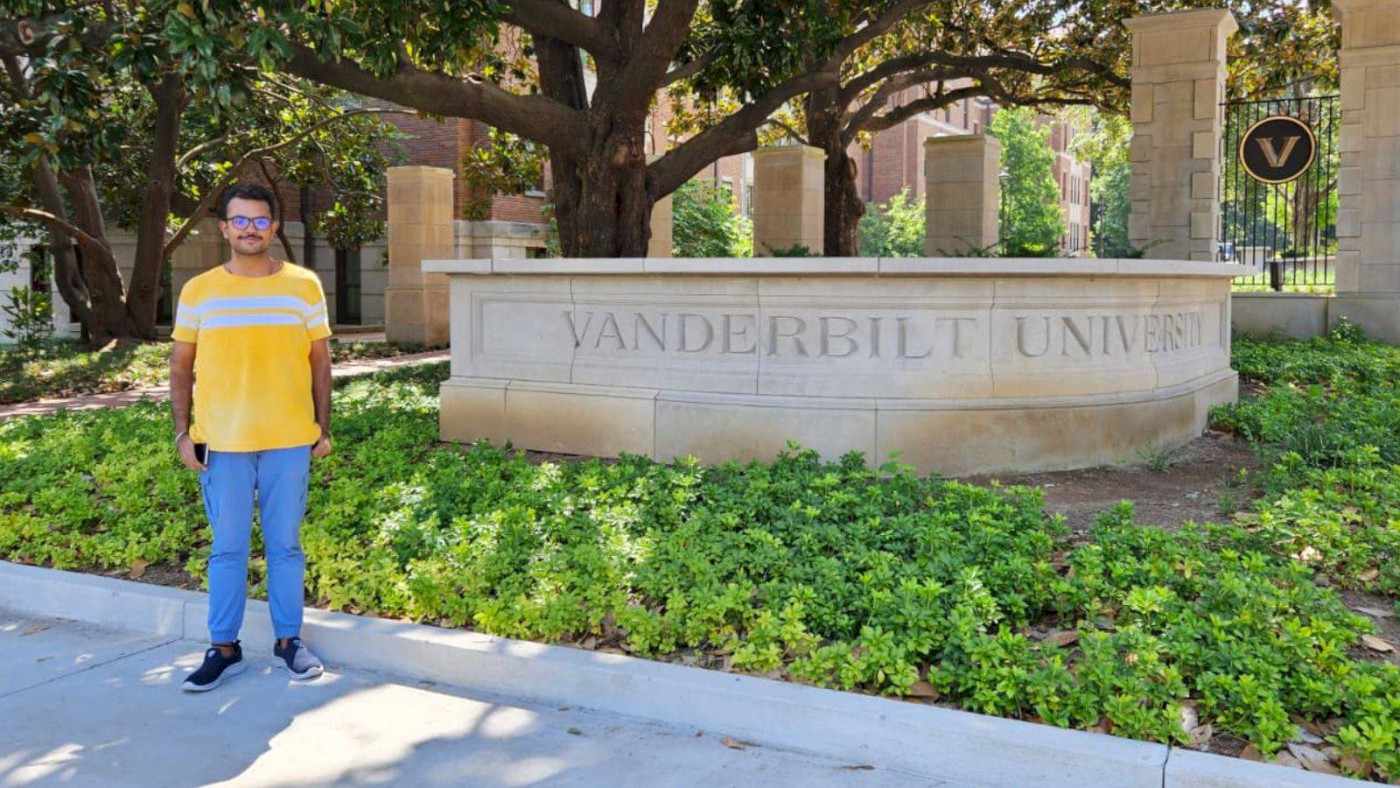30 July 2025
A Cosmic Journey to Vanderbilt and Harvard University

At the impressive age of 24, our graduate has become an accomplished researcher with 38 research papers to his credit. In 2022, he was elected to the Royal Astronomical Society, becoming the world's youngest fellow. His upcoming book, the 16th volume in World Scientific's prestigious series on Cosmology and Astrophysics, holds special significance as renowned scientist Stephen Hawking authored its eighth volume. Incidentally, he is the only author in this series without a PhD and the only one under 40.
Meet Oem Trivedi, a 2025 graduate of the BS (Hons) programme. His passion for cosmology earned him the highly competitive Vanderbilt Discovery Doctoral Fellowship, a prestigious award rarely given to STEM candidates. This achievement makes him the only Indian admitted to the programme this year, securing comprehensive funding for his five-year doctoral studies.
Oem has also become an active member of the Galileo Research Project at Harvard, contributing to cutting-edge research. In this feature, Oem details his work and his aspiration to identify and resolve fundamental problems in cosmology, striving to make contributions that will eventually feature in textbooks.
Oem's tryst with physics began in sixth grade. While visiting his mother in college, he encountered a documentary titled "E = MC²." Though initially unfamiliar with Albert Einstein, the eminent theoretical physicist, Einstein's struggles left a lasting impact. Despite being a patent clerk with poor recommendations, no stable income, a child, and a wife, Einstein persevered to produce groundbreaking work in 1905.
This experience, around 2011 or 2012, led Oem to a powerful epiphany: the only way to be immortal in this world is through one's ideas. Witnessing how scientists and mathematicians are still discussed centuries after their deaths, he realised that lasting impact stems from intellectual contributions.
Oem's inclination towards cosmology and particle physics propelled him to pursue research early. His foundational research journey began during his first year of University, amidst the COVID-19 pandemic. Oem explored advanced topics like general relativity during this period and began reading research papers. Recognising the opportunity presented by the lockdown, he leveraged his free time to conduct his own theoretical physics work, resulting in the publication of nearly seven single-authored papers in premier cosmology and astrophysics journals.
Upon returning to campus in 2022, Oem interacted with one of India's leading cosmologists, Pankaj Joshi, who serves as the Director of the International Centre for Space and Cosmology and Distinguished Professor of Physics at the School of Arts and Sciences at Ahmedabad University. Inspired by Professor Joshi's work on naked singularities and his proposed theory for primordial dark matter, Oem explored the cosmological aspects of naked singularities for his undergraduate thesis. Professor Joshi subsequently served as his undergraduate thesis advisor.
This collaboration allowed Oem to expand his knowledge in cosmology further, despite having already studied various areas in detail, from the early to the current and late universe. Additionally, Oem collaborated with former Ahmedabad University Professor Adarsh Ganesan on an innovative concept born from the intersection of cosmology and condensed matter physics.
He explored shared mathematical structures between their vastly different fields. This interdisciplinary research offers a potential solution to the Hubble tension, a considerable discrepancy in the universe's expansion rate. Their work suggests that subtle "frequency comb" patterns in dark energy could reconcile conflicting measurements, bridging this crucial cosmological gap, highlighting the practical applications and potential of interdisciplinary approaches in cosmology.
Oem is not only studying cutting-edge cosmology but also actively creating new frontiers. For nearly two years, he's collaborated with Professor Robert Scherrer (his main advisor at Vanderbilt), proposing the "Long Freeze" theory in 2024, a new scenario for the universe's slow death that garnered global media attention. More recently, with his Harvard co-advisor, Professor Abraham (Avi) Loeb, Oem put forward a new dark matter theory: "Planck Star Remnants," suggesting tiny remnants of ancient black holes could account for this mysterious matter, supported by their calculations.
In addition to his ongoing research, Oem is an active member of the Harvard's Galileo Project. This research group, led by Professor Loeb, is dedicated to debunking conspiracy theories on extraterrestrial life, particularly in light of Professor Loeb's discovery of 'Oumuamua.' This mysterious interstellar object entered the solar system in a way that natural mechanisms couldn't explain.
Oem works within an interdisciplinary team comprising cosmologists, particle physicists, computer scientists, and biologists. The team also includes individuals from unexpected fields, such as finance corporations and former space advisors from NASA and SpaceX. Professors from Ivy League institutions like Princeton, Yale, and Harvard also contribute to this collaborative effort.
He is specifically part of the theoretical analysis sub-team, where he collaborates with a particle physics PhD from Stanford and a computer science PhD from the University of Manchester. This diverse team collectively strives to identify the nature of objects observed across our solar system and beyond.
Oem's story speaks volumes about intellectual ambition and scholarship that Ahmedabad University seeks to cultivate. His early research breakthroughs, recognitions, and active roles in elite global collaborations reflect his perseverance and the University's commitment to nurturing thinkers and knowledge creators. Oem's story exemplifies Ahmedabad University's academic ecosystem, which empowers students to contribute meaningfully to the world of ideas.



